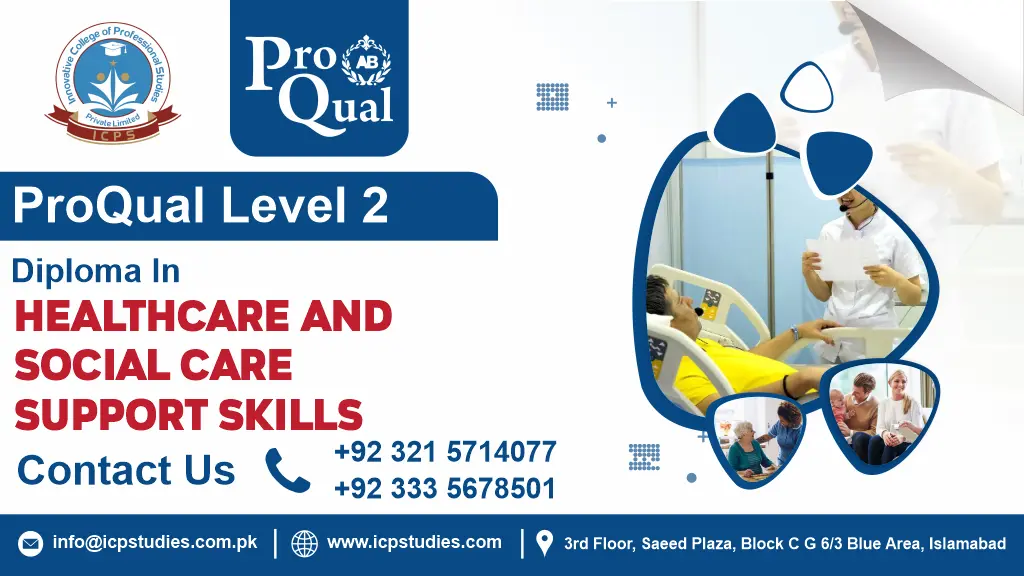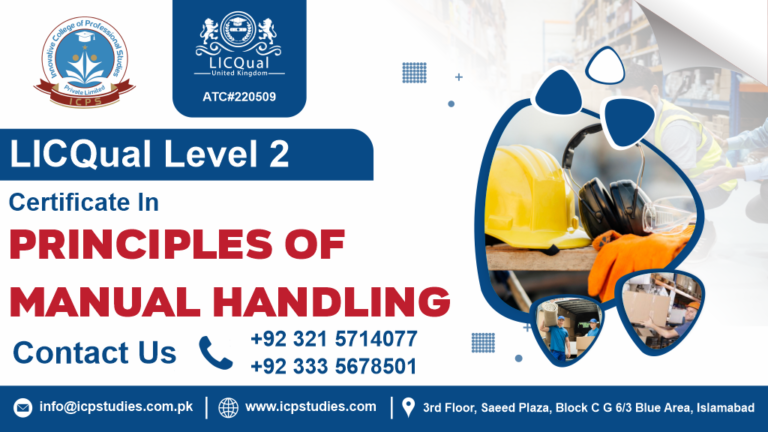Are you ready to embark on a fulfilling career in healthcare and social care? The ProQual Level 2 Diploma in Healthcare and Social Care Support Skills is your gateway to success. This comprehensive qualification offers you the knowledge, practical skills, and competence needed to excel in this dynamic and rewarding field.
Because it goes beyond the basics. We dive deep into the intricacies of healthcare and social care, equipping you with a broader understanding and a wider range of skills. From communication techniques to infection control, person-centered care to mental health and dementia support, our diploma covers it all.
Imagine being able to communicate effectively with individuals, their families, and multidisciplinary teams. Envision creating a safe environment where both individuals and staff thrive. Picture providing personalized care that respects the unique needs and preferences of each person you support. With the ProQual Level 2 Diploma, you’ll gain the practical skills to make it all happen.
But it doesn’t stop there. Safeguarding vulnerable individuals is a top priority in healthcare and social care, and our diploma ensures you’re prepared. You’ll learn to identify signs of abuse, respond appropriately, and implement measures to protect those in your care. Plus, our specialized modules on mental health and dementia care will give you the expertise to make a difference in these crucial areas.
By completing the ProQual Level 2 Diploma, you’ll demonstrate your competence and readiness to work in a variety of healthcare and social care settings. Whether you dream of becoming a healthcare assistant, a support worker, or advancing to higher-level qualifications, this diploma sets you on the path to success.
Don’t miss this opportunity to become a compassionate caregiver and make a positive impact on people’s lives. Enroll in the ProQual Level 2 Diploma in Healthcare and Social Care Support Skills today and unlock a world of rewarding career opportunities. Your journey starts here.

Innovative College of Professional Studies (Private) Limited (ICPS) is offering ProQual Qualifications in association with Inspire College of Technologies (ICTQual)
All About ProQual Level 2 Diploma in Healthcare and Social Care Support Skills
Course Overview
The ProQual Level 2 Diploma in Healthcare and Social Care Support Skills is an extensive and esteemed qualification meticulously designed to furnish individuals with the essential knowledge, practical expertise, and proficiency requisite for success within the healthcare and social care sector. This diploma program surpasses foundational levels, providing an in-depth exploration of diverse facets of healthcare and social care, thus endowing learners with a broader comprehension and an expanded skill set.
Encompassing a wide array of subjects, the diploma addresses crucial areas such as communication skills, health and safety protocols, infection control, person-centered care, safeguarding, promotion of independence, and specialized fields like mental health and dementia care. Its comprehensive curriculum aptly prepares learners to address the intricate needs of individuals requiring healthcare and social care support.
Through a blend of theoretical learning and hands-on application, learners cultivate a profound appreciation of the principles and ethics underpinning healthcare and social care practices. They acquire vital communication skills, facilitating effective engagement with individuals, families, and interdisciplinary teams.
The ProQual Level 2 Diploma places significant emphasis on adhering to health and safety regulations, enabling learners to identify and mitigate potential risks, thereby fostering safe environments for both individuals and staff. Thorough exploration of infection control measures aims to minimize infection risks and enhance the well-being of individuals in healthcare and social care settings.
Central to the diploma is the principle of person-centered care, emphasizing the recognition and respect of individuals’ unique needs, preferences, and autonomy. Learners develop practical skills to perform personal care tasks with dignity and privacy, while also promoting independence.
Safeguarding vulnerable individuals constitutes a fundamental aspect of the diploma, equipping learners with the knowledge and skills to recognize signs of abuse, neglect, or harm, and to implement appropriate safeguarding measures to ensure individuals’ safety and well-being.
Additionally, the ProQual Level 2 Diploma offers specialized modules focusing on mental health and dementia care, enabling learners to gain deeper insights into these specific areas and deliver compassionate and effective support to individuals facing mental health challenges or living with dementia.
Successful completion of the ProQual Level 2 Diploma in Healthcare and Social Care Support Skills demonstrates individuals’ competency and readiness to thrive in various healthcare and social care settings. This qualification unlocks diverse career pathways, including roles as healthcare assistants, support workers, care coordinators, or opportunities for further professional advancement.
The ProQual Level 2 Diploma equips learners with the requisite skills, knowledge, and confidence to positively impact the lives of individuals requiring healthcare and social care support. Serving as a springboard for professional growth within the dynamic and rewarding healthcare and social care landscape, this diploma paves the way for meaningful contributions and ongoing development.
Learning Outcomes
Upon completion of the ProQual Level 2 Diploma in Healthcare and Social Care Support Skills, learners will achieve the following learning outcomes:
- Knowledge and Understanding: Acquire a comprehensive understanding of the principles and values that underpin healthcare and social care practices. Develop knowledge of ethical considerations, legal obligations, and professional standards relevant to the industry.
- Effective Communication: Master effective communication techniques, both verbal and non-verbal, to engage with individuals, their families, and multidisciplinary teams. Demonstrate active listening skills and empathy in order to establish rapport and build trust.
- Health and Safety: Understand health and safety regulations in healthcare and social care settings. Identify and mitigate potential risks to create safe environments for individuals and staff. Demonstrate knowledge of infection control measures to prevent the spread of infections and maintain a hygienic environment.
- Person-Centered Care: Apply person-centered approaches in providing care and support to individuals. Recognize and respect their autonomy, choices, and preferences. Tailor care to meet individual needs, promote independence, and maintain dignity and privacy.
- Safeguarding and Protection: Identify signs of abuse, neglect, or harm, and respond appropriately. Implement safeguarding measures to protect vulnerable individuals and ensure their safety and well-being. Adhere to ethical and legal responsibilities in safeguarding practices.
- Practical Skills Development: Develop practical skills necessary for providing hands-on care and support. Assist individuals with personal care tasks such as bathing, dressing, and feeding, while maintaining dignity and promoting independence. Manage challenging behaviors effectively.
- Specialized Areas: Gain specialized knowledge and skills in mental health and dementia care. Understand the unique needs and challenges faced by individuals in these areas. Provide compassionate and effective support to promote mental well-being and enhance the quality of life for individuals with dementia.
- Professional Growth: Demonstrate professionalism, reliability, and accountability in healthcare and social care settings. Recognize the importance of continuous professional development and seek opportunities for further learning and advancement within the sector.
The ProQual Level 2 Diploma in Healthcare and Social Care Support Skills equips learners with the necessary knowledge, practical skills, and competence to provide compassionate care, maintain a safe environment, and make a positive impact on the lives of individuals in need of healthcare and social care support.
Admission Criteria
To enroll in the ProQual Level 2 Diploma in Healthcare and Social Care Support Skills, learners are typically required to meet the following entry requirements:
- Age: Learners must be at least 16 years old. This ensures that individuals have the maturity and readiness to engage in the course content and responsibilities associated with working in healthcare and social care settings.
- Language Proficiency: As the course involves communication with individuals receiving care, a good command of the English language is essential. Learners should be able to understand and communicate effectively in English to ensure proper comprehension and delivery of healthcare and social care support.
- Educational Background: There are generally no specific educational qualifications required to enroll in this course. However, a basic level of literacy and numeracy skills is beneficial to comprehend course materials and complete assessments.
- Physical and Mental Fitness: Given the nature of the healthcare and social care sector, learners should have the physical and mental capabilities to carry out the required tasks safely and effectively. This includes being able to handle physical demands, such as assisting with personal care tasks, and maintaining emotional resilience when faced with challenging situations.
- Personal Attributes: Learners should possess qualities such as empathy, compassion, patience, and a genuine desire to help others. These attributes are vital for providing person-centered care and establishing positive relationships with individuals receiving support.
Ideal Candidate
The ProQual Level 2 Diploma in Healthcare and Social Care Support Skills is designed for individuals who have a passion for caring for others and aspire to pursue a career in the healthcare and social care sector. This course is ideal for:
- Aspiring Caregivers: Individuals who are new to the field and want to start their journey in healthcare and social care. This course provides a solid foundation of knowledge and skills necessary to excel in various care roles.
- Healthcare Assistants: Current or aspiring healthcare assistants who want to enhance their existing skills and expand their career opportunities. The diploma offers a comprehensive curriculum that goes beyond basic training, enabling healthcare assistants to provide high-quality care and support.
- Support Workers: Individuals working as support workers in healthcare and social care settings who want to broaden their knowledge and acquire a recognized qualification. This course equips support workers with the necessary competencies to deliver person-centered care and promote the well-being of individuals.
- Career Changers: Individuals who are transitioning from other industries and wish to embark on a new and fulfilling career in healthcare and social care. This course provides the essential knowledge and practical skills needed to succeed in this field.
- Personal Development Seekers: Individuals who have a personal interest in healthcare and social care and want to enhance their understanding of the sector. This course offers valuable insights and knowledge that can be applied to personal caregiving responsibilities or volunteer work.
- Progression to Higher Qualifications: Learners who aim to further their education and pursue higher-level qualifications in healthcare and social care. The ProQual Level 2 Diploma serves as a stepping stone for further studies and career advancement within the sector.
This course is suitable for individuals with a compassionate nature, excellent communication skills, and a genuine desire to make a positive impact on the lives of others. It provides the necessary knowledge, practical skills, and competence to succeed in various roles, including healthcare assistants, support workers, care coordinators, and more.
Key Takeaways
To achieve the ProQual Level 2 Diploma in Healthcare and Social Care Support Skills; Candidates must achieve a minimum of 37 credits: a minimum of 25credits must be from the Level 2 units and the remaining 12 credits can be from any combination of units from the Level 2 or Level 3 or Level 4 units
Level 2 Units
| Sr# | Unit Title | Credit Value | GLH |
|---|---|---|---|
| 1 | Implement person centred approaches in health and social care | 5 | 33 |
| 2 | Principles of safeguarding and protection in health and social care | 3 | 26 |
| 3 | Assist in the administration of medication | 4 | 25 |
| 4 | Carry out personal hygiene for individuals unable to care for themselves | 3 | 23 |
| 5 | Support individuals with speech and language disorders to develop their communication skills | 4 | 28 |
| 6 | Perform the non-scrubbed circulating role for perioperative procedures | 3 | 23 |
| 7 | Minimise the risk of infection when transporting and storing healthcare waste | 3 | 20 |
| 8 | Assist in the issuing of prescribed items | 3 | 15 |
| 9 | Assist in the manufacture and assembly of medicinal products | 7 | 20 |
| 10 | Assist in the preparation of documentation, materials and other items for manufacture and assembly of medicinal products | 10 | 40 |
| 11 | Support individuals to carry out their own health care procedures | 2 | 15 |
| 12 | Provide support for therapy sessions | 2 | 14 |
| 13 | Contribute to the discharge of individuals to carers | 2 | 14 |
| 14 | Paediatric Emergency First Aid | 1 | 10 |
| 15 | Introduction to communication in health, social care or children’s and young people’s settings | 3 | 23 |
| 16 | Support individuals to meet personal care needs | 2 | 16 |
| 17 | Contribute to the safe use of medical devices in the perioperative environment | 4 | 29 |
| 18 | Causes and Spread of Infection | 2 | 20 |
| 19 | Prepare documentation, materials, components and other items for the preparation of aseptic products | 6 | 10 |
| 20 | Introduction to duty of care in health, social care or children’s and young people’s settings | 1 | 9 |
| 21 | Provide support for mobility | 2 | 14 |
| 22 | Assist others to plan presentations | 2 | 16 |
| 23 | Order Routine Pharmaceutical Stock | 3 | 11 |
| 24 | Dementia Awareness | 2 | 17 |
| 25 | Move and position individuals in accordance with their plan of care | 4 | 26 |
| 26 | Support individuals to manage continence | 3 | 19 |
| 27 | Handle information in health and social care settings | 1 | 10 |
| 28 | The role of the health and social care worker | 2 | 14 |
| 29 | Obtain and test specimens from individuals | 2 | 12 |
| 30 | Prepare individuals for healthcare activities | 3 | 17 |
| 31 | Assist in planning and evaluating learning activities | 3 | 22 |
| 32 | Assist the practitioner to carry out health care activities | 2 | 13 |
| 33 | Minimise the risk of infection during the removal of used linen | 2 | 15 |
| 34 | Inform an individual of discharge arrangements | 2 | 13 |
| 35 | Understand the context of supporting individuals with learning disabilities | 4 | 35 |
| 36 | Select and wear appropriate personal protective equipment for work in health care settings | 2 | 15 |
| 37 | Monitor and maintain the environment and resources during and after clinical / therapeutic activities | 3 | 20 |
| 38 | Prepare and dress for scrubbed clinical roles | 4 | 28 |
| 39 | Care for individuals with naso-gastric tubes | 3 | 20 |
| 40 | The principles of Infection Prevention and Contro | 3 | 30 |
| 41 | Assist with the provision of a pharmacy service to meet individuals’ needs | 3 | 10 |
| 42 | Contribute to the effectiveness of teams | 3 | 5 |
| 43 | Introduction to personal development in health, social care or children’s and young people’s settings | 3 | 23 |
| 44 | Support individuals who are distressed | 3 | 21 |
| 45 | Support individuals undergoing healthcare activities | 3 | 22 |
| 46 | Prepare equipment for intraoperative cell salvage blood processing | 4 | 26 |
| 47 | Assist in receiving, handling and dispatching clinical specimens | 2 | 17 |
| 48 | Assist in the sale of medicines and products | 8 | 50 |
| 49 | Receive Pharmaceutical Stock | 3 | 9 |
| 50 | Prepare aseptic products | 10 | 40 |
| 51 | Prepare and apply dressings and drains to individuals in the perioperative environment | 2 | 18 |
| 52 | Planning and Monitoring Work | 2 | 8 |
| 53 | Cleaning, Decontamination and Waste Management | 2 | 20 |
| 54 | Ensure your own Actions Reduce risks to Health and Safety | 2 | 8 |
| 55 | Introduction to equality and inclusion in health, social care or children’s and young people’s settings | 2 | 20 |
| 56 | Provide agreed support for foot care | 3 | 23 |
| 57 | Contribute to health and safety in health and social care | 4 | 33 |
| 58 | Support independence in the tasks of daily living | 5 | 33 |
| 59 | Prepare equipment for intraoperative cell salvage blood collection | 2 | 17 |
| 60 | Maintaining quality standards in the health sector | 1 | 8 |
| 61 | Emergency First Aid Skills | 1 | 10 |
| 62 | Assemble prescribed items | 3 | 15 |
| 63 | Support participation in learning and development activities | 3 | 23 |
| 64 | Provide support for sleep | 2 | 13 |
| 65 | Remove wound closure materials | 3 | 24 |
| 66 | Support individuals to eat and drink | 2 | 15 |
| 67 | Undertake agreed pressure area care | 4 | 30 |
| 68 | Meet food safety requirements when providing food and drink for individuals | 2 | 15 |
| 69 | Understand loss and grief in end of life care | 3 | 22 |
| 70 | Understand how to work in end of life care | 3 | 28 |
| 71 | Service improvements in the health sector | 2 | 15 |
Level 3 Units
| Sr# | Unit Title | Credit Value | GLH |
|---|---|---|---|
| 1 | Work with babies and young children to promote their development and learning | 6 | 45 |
| 2 | Engage in personal development in health, social care or children’s and young people’s settings | 3 | 10 |
| 3 | Support individuals with multiple conditions and/or disabilities | 4 | 31 |
| 4 | Support individuals who are bereaved | 4 | 30 |
| 5 | Prepare for and carry out extended feeding techniques | 4 | 27 |
| 6 | Provide support to continue recommended therapies | 3 | 20 |
| 7 | Insert and secure nasogastric tubes | 4 | 30 |
| 8 | Develop positive relationships with children and young people | 4 | 30 |
| 9 | Provide advice and information to enable parents to promote the health and well-being of their newborn babies | 3 | 22 |
| 10 | Facilitate and monitor housing and accommodation services to support individuals with mental health needs | 5 | 32 |
| 11 | Collaborate in the assessment of environmental and social support in the community | 4 | 23 |
| 12 | Influencing Others at Work | 1 | 6 |
| 13 | Care for the physical and nutritional needs of babies and young children | 6 | 45 |
| 14 | Support families who have a child with a disability | 3 | 23 |
| 15 | Support individuals to manage their finances | 3 | 20 |
| 16 | Obtain venous blood samples | 3 | 24 |
| 17 | Implement therapeutic group activities | 4 | 25 |
| 18 | Collate and communicate health information to individuals | 3 | 20 |
| 19 | Provide information and advice to individuals on eating to maintain optimum nutritional status | 5 | 38 |
| 20 | Assist in the implementation of programmes to increase mobility, movement and functional independence | 4 | 28 |
| 21 | Receive and handle clinical specimens within the sterile field | 4 | 30 |
| 22 | Prepare anaesthetic environment and provide support for pre and post-operative anaesthesia and recovery | 5 | 38 |
| 23 | Make recommendations for the use of physical resources in a health setting | 5 | 33 |
| 24 | Maintaining quality standards in the health sector | 2 | 13 |
| 25 | Understand Models of Disability | 3 | 26 |
| 26 | Support individuals to access and use services and facilities | 4 | 25 |
| 27 | Promote and implement health and safety in health and social care | 6 | 43 |
| 28 | Support young people with a disability to make the transition into adulthood | 5 | 40 |
| 29 | Understand mental well-being and mental health promotion | 3 | 14 |
| 30 | Carry out vision screening | 4 | 27 |
| 31 | Assist professionals to support individuals from diverse linguistic and cultural backgrounds to access speech and language therapy services | 5 | 35 |
| 32 | Implement hydrotherapy programmes for individuals and groups | 5 | 35 |
| 33 | Deliver exercise sessions to improve individuals’ health and wellbeing | 5 | 32 |
| 34 | Provide support to the surgical team when preparing individuals for operative and invasive procedures | 4 | 32 |
| 35 | Facilitate person centred assessment, planning, implementation and review | 6 | 45 |
| 36 | Work in partnership with families to support individuals | 4 | 27 |
| 37 | Support individuals to develop and run support groups | 3 | 24 |
| 38 | Monitor own work practice in health, social care or children’s and young people’s settings | 3 | 20 |
| 39 | Perform first line calibration on clinical equipment to ensure it is fit for use | 3 | 20 |
| 40 | Monitor and review individuals progress in relation to maintaining optimum nutritional status | 3 | 26 |
| 41 | Give presentations to groups | 4 | 26 |
| 42 | Support individuals in undertaking their chosen activities | 4 | 24 |
| 43 | Control the use of physical resources in a health setting | 3 | 25 |
| 44 | Support children and young people experiencing transitions | 3 | 28 |
| 45 | Promote communication in health, social care or children’s and young people’s settings | 3 | 10 |
| 46 | Contribute to the prevention of aggressive and abusive behaviour of people | 4 | 26 |
| 47 | Service improvement in the health sector | 3 | 20 |
| 48 | Understand the process and experience of dementia | 3 | 22 |
| 49 | Understand Physical Disability | 3 | 22 |
| 50 | Support individuals with a learning disability to access healthcare | 3 | 25 |
| 51 | Undertake urethral catheterisation processes | 4 | 28 |
| 52 | Promote good practice in handling information in health and social care settings | 2 | 16 |
| 53 | Understand mental health problems | 3 | 14 |
| 54 | Perform routine Electrocardiograph ECG Procedures | 4 | 30 |
| 55 | Undertake treatments and dressings of lesions and wounds | 4 | 25 |
| 56 | Adapt and fit healthcare equipment, medical devices, assistive technology, or products, to meet individuals’ needs | 6 | 37 |
| 57 | Administer oral nutritional products to individuals | 5 | 35 |
| 58 | Promote effective communication with individuals with sensory loss | 4 | 30 |
| 59 | Work with other professionals and agencies to support individuals with physical disability | 3 | 23 |
| 60 | Support individuals to access housing and accommodation services | 4 | 24 |
| 61 | Identify information requirements in a health context | 4 | 30 |
| 62 | Prepare and reproduce permanent radiographic images | 4 | 23 |
| 63 | Develop and prepare speech and language therapy resources for alternative and augmentative communication AAC use | 4 | 25 |
| 64 | Carry out wound drainage care | 4 | 32 |
| 65 | Prepare and provide surgical instrumentation and supplementary items for the surgical team | 6 | 43 |
| 66 | Care for a newly born baby when the mother is unable to do so | 4 | 32 |
| 67 | Understand Child and Young Person Development | 4 | 30 |
| 68 | Provide support to maintain and develop skills for everyday life | 4 | 28 |
| 69 | Facilitate learning and development activities to meet individual needs and preferences | 5 | 35 |
| 70 | Enable individuals with behavioural difficulties to develop strategies to change their behaviour | 8 | 41 |
| 71 | Reprocess endoscopy equipment | 4 | 30 |
| 72 | Support individuals with cognition and learning difficulties | 5 | 34 |
| 73 | Assist in testing individuals’ abilities prior to planning physical activities | 5 | 38 |
| 74 | Support individuals to manage dysphagia | 5 | 35 |
| 75 | Provide advice on foot care for individuals with diabetes | 3 | 23 |
| 76 | Transport, transfer and position individuals and equipment within the perioperative environment | 5 | 32 |
| 77 | Understand Sensory Loss | 3 | 21 |
| 78 | Support families who are affected by Acquired Brain Injury | 3 | 30 |
| 79 | Support individuals during a period of change | 4 | 29 |
| 80 | Perform intravenous cannulation | 4 | 34 |
| 81 | Care for individuals with urethral catheters | 4 | 30 |
| 82 | Conduct routine maintenance on clinical equipment | 4 | 30 |
| 83 | Assist and support individuals to use alternative and augmentative communication systems _AAC | 5 | 35 |
| 84 | Measure and record individuals’ body fluid balance in a perioperative environment | 4 | 23 |
| 85 | Support parents/carers to interact with and care for their newborn baby | 4 | 30 |
| 86 | Deliver training through demonstration and instruction | 3 | 21 |
| 87 | Principles for implementing duty of care in health, social care or children’s and young people’s settings | 1 | 5 |
| 88 | Promote Child and Young Person Development | 3 | 25 |
| 89 | Develop and sustain effective working relationships with staff in other agencies | 4 | 24 |
| 90 | Undertake physiological measurements | 3 | 23 |
| 91 | Undertake stoma care | 4 | 30 |
| 92 | Assure the effective functioning of radiographic image processing equipment | 4 | 25 |
| 93 | Operate equipment for intraoperative cell salvage blood collection | 5 | 40 |
| 94 | Advise and inform individuals on managing their condition | 5 | 31 |
| 95 | Assist others to monitor individuals’ progress in managing dysphagia | 5 | 38 |
| 96 | Support carers to meet the care needs of individuals | 5 | 30 |
| 97 | Maintain pharmaceutical stock | 3 | 4 |
| 98 | Anatomy and Physiology for Maternity Support Workers | 2 | 20 |
| 99 | Receive prescriptions from individuals | 3 | 15 |
| 100 | Understand how to support individuals with autistic spectrum conditions | 3 | 28 |
| 101 | Support Individuals with Specific Communication Needs | 5 | 35 |
| 102 | Obtain and test capillary blood samples | 4 | 30 |
| 103 | Support individuals at the end of life | 7 | 53 |
| 104 | Contribute to effective multidisciplinary team working | 3 | 20 |
| 105 | Analyse and present health related data and information | 4 | 30 |
| 106 | Remove wound drains | 4 | 27 |
| 107 | Develop activities and materials to enable individuals to reach specific communication goals | 5 | 38 |
| 108 | Operate equipment for intraoperative cell salvage blood processing and complete intraoperative cell salvage blood process | 5 | 39 |
| 109 | Support parents/carers and those in a parental role to care for babies during their first year | 5 | 36 |
| 110 | Obtain a client history | 3 | 22 |
| 111 | Manage the availability of physical resources to meet service delivery needs in a health setting | 5 | 33 |
| 112 | Administer medication to individuals, and monitor the effects | 5 | 30 |
| 113 | Assist in the Issuing of Pharmaceutical Stock | 4 | 5 |
| 114 | Undertake an in-process accuracy check of assembled prescribed items prior to the final accuracy check | 4 | 11 |
| 115 | Promote equality and inclusion in health, social care or children’s and young people’s settings | 2 | 8 |
| 116 | Understand the impact of Acquired Brain Injury on individuals | 3 | 28 |
| 117 | Support individuals to live at home | 4 | 25 |
| 118 | Promote person centred approaches in health and social care | 6 | 41 |
| 119 | Undertake tissue viability risk assessments | 3 | 26 |
| 120 | Interact with and support individuals using telecommunications | 5 | 36 |
| 121 | Manufacture equipment or medical devices for individuals within healthcare | 4 | 30 |
| 122 | Provide support for individuals with communication and interaction difficulties | 5 | 39 |
| 123 | Monitor individuals’ progress in relation to managing their body weight and nutrition | 3 | 26 |
| 124 | Assist in implementing treatment programmes for individuals with severely reduced movement/mobility | 5 | 29 |
| 125 | Assist in the delivery of perioperative care and support to individuals | 4 | 31 |
| 126 | Examine the feet of individuals with diabetes | 4 | 32 |
Level 4 Units
| Sr# | Unit Title | Credit Value | GLH |
|---|---|---|---|
| 1 | Support disabled children and young people and those with specific requirements | 6 | 45 |
| 2 | Enable children and young people to understand their health and well-being | 5 | 38 |
| 3 | Develop and agree individualised care plans for babies and families | 5 | 38 |
FAQs for ProQual Level 2 Diploma in Healthcare and Social Care Support Skills







